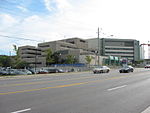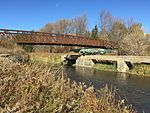Newmarket GO Station
Buildings and structures in Newmarket, OntarioDesignated heritage railway stations in OntarioGO Transit railway stationsRail transport in Newmarket, OntarioRailway stations in Canada opened in 1900 ... and 1 more
Railway stations in the Regional Municipality of York

Newmarket GO Station is a train station in the GO Transit network located in the Old Davis Tannery Centre on the north side of Davis Drive East in Newmarket, Ontario, Canada, and is a stop on the Barrie line train service. It is a little over two kilometres east of the Newmarket Bus Terminal, at Davis Drive West and Eagle Street, which is a terminus for GO Bus, York Region Transit and Viva BRT services.
Excerpt from the Wikipedia article Newmarket GO Station (License: CC BY-SA 3.0, Authors, Images).Newmarket GO Station
Davis Drive, Newmarket
Geographical coordinates (GPS) Address Nearby Places Show on map
Geographical coordinates (GPS)
| Latitude | Longitude |
|---|---|
| N 44.060555555556 ° | E -79.460277777778 ° |
Address
The Tannery
Davis Drive 465
L3Y 3Y1 Newmarket
Ontario, Canada
Open on Google Maps




